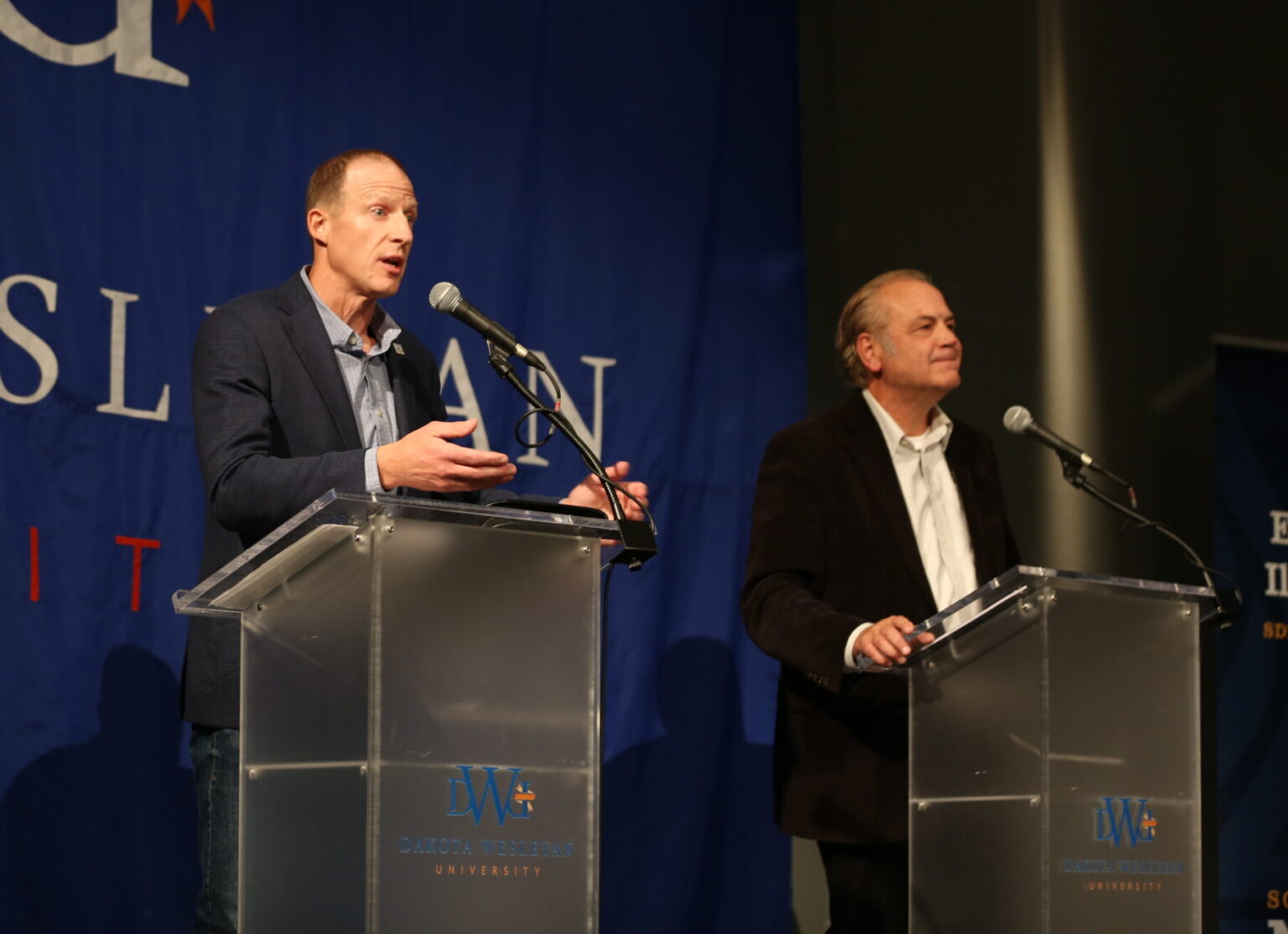
Joshua Haiar/South Dakota Searchlight
Backers of a ballot measure intended to remove sales taxes on groceries say it’s about helping people with low incomes. Opponents say the measure would affect more than groceries and could cut hundreds of millions in revenue from the budget of an already low-tax state, with no plan to replace it.
The ballot question committee Dakotans for Health gathered the petition signatures to put Initiated Measure 28 on the Nov. 5 ballot, where it’s one of seven statewide questions under consideration by voters.
Rick Weiland, chairman of Dakotans for Health, said during a recent debate in Mitchell that opponents are mischaracterizing the measure.
“It’s a campaign of fear, and it’s a campaign of hypotheticals,” he said.
Scope of measure disputed
Initiated Measure 28 would remove the 4.2% state sales tax on goods for “human consumption,” excluding alcohol and prepared food. Opponents say the term “human consumption” would cover a broader range of goods, not just groceries as the bill’s backers intend.
The South Dakota Legislative Research Council estimates the measure could cause state revenue losses between $134 million and $646 million annually, depending on how it’s interpreted.
Attorney General Marty Jackley has warned that the measure could impact the state’s $22 million annual legal settlement with tobacco companies intended to reduce smoking. That’s because state law defines tobacco products as intended for human consumption, and collecting the settlement money requires a sales tax on tobacco. South Dakota collects about $43 million annually in tobacco taxes.
If only tobacco and grocery sales taxes were eliminated, the state could face an approximately $176 million budget reduction, according to the Legislative Research Council. Republican legislative leaders estimate the state would need to cut 7% from its budget, or 5% if revenue growth is strong.
“IM 28 is going to hurt those people who depend the most on public services,” Sanderson said during the Mitchell debate. “It impacts low-income South Dakotans the most.”
Those potential cuts have the South Dakota Education Association opposing the measure, too. South Dakota is 49th in the nation for average teacher pay. Association President Loren Paul said in a statement to South Dakota Searchlight that schools are making progress addressing a teacher shortage, thanks to recent increases in state funding for education.
“IM 28’s cuts would undermine this progress, potentially returning South Dakota to its previous position of 51st in the nation for teacher pay,” Paul said.
Concerns about budget problems also inspired Initiated Measure 28’s opponents to hold a press conference in July calling the measure “a trap” that could ultimately result in a push for an income tax to replace the lost revenue. Supporters of the measure say South Dakota’s Republican-dominated Legislature and electorate would never support an income tax.
Weiland has little empathy for the budget concerns, considering the state, by its own admission, already has $1.4 billion worth of sales and use tax exemptions for various categories of businesses and services.
“There are even pipeline sales tax exemptions in here,” Weiland said during the debate. “There are sales tax exemptions for bull semen and rodeo clowns. We’re talking about families in South Dakota that are struggling.”
What’s described by his opponents as a loss of state revenue can also be described as tax relief for low-income people, Weiland added.
“We hear a lot from special interest groups in the Capitol every year,” he said, “but it’s time that we lobby on behalf of the taxpayer.”
Effect on cities also in dispute
The measure states it would not affect the ability of cities to impose their own sales taxes on human consumption goods.
Opponents dispute that point. Existing state law says cities can’t impose sales taxes on anything the state doesn’t tax. That law and Initiated Measure 28 would be in conflict if the measure passes, opponents say, and the conflict might have to be settled in court. Opponents say that would put $51 million of annual city sales tax revenue at risk.
According to the state’s Legislative Research Council and Neal Fulton, dean of the Knudson School of Law at the University of South Dakota, new state law generally supersedes old state law when conflicts arise.
The South Dakota Municipal League does not want to risk cities’ budgets on a judge’s interpretation. It too is part of the effort to defeat the measure.
Meanwhile, the South Dakota Democratic Party issued a press release in support of the measure, calling it immoral to tax people for buying food.
Among the 45 states that collect a statewide sales tax, South Dakota is currently 36th in combined state and local rates, making it one of the lowest, according to the nonprofit and nonpartisan Tax Foundation. South Dakota and Mississippi are the only sales-tax states that apply their full tax rates to groceries.
